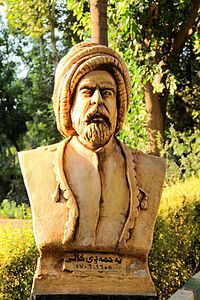History of Ahmad Khani
For the village in Iran, see Ahmad Khani, Iran.
Ahmad Khani, also spelled Ahmad-i Khani (Kurdish: Ehmedê Xanî; 1650, Hakkari – 1707, Doğubayazıt), was a Kurdish writer, poet, astronomer and philosopher.[1] He was born amongst the Khani's tribe in Hakkari province in present-day Turkey. He moved to Bayezid in Ritkan province and settled there. Later he started with teaching Kurdish (Kurmanji) at basic level. Khani was fluent in Kurdish, Arabic and Persian. He wrote his Arabic-Kurdish dictionary "Nûbihara Biçûkan" (The Spring of Children) in 1683 to help children with their learning process.[2]
His most important work is the Kurdish classic love story "Mem and Zin" (Mem û Zîn) (1692),[3] which has been translated to many languages including Arabic, Russian and Turkish.[4] This epic has several facets and has been interpreted from different angles, but one its most important parts is its preface in which Khani calls for a Kurdish state. Therefore, many consider Mam and Zin to be the first expression of Kurdish nationalism.[4][5]
His other work include a book called Eqîdeya Îmanê (The Path of Faith), which is part poem and part prose. The book explains the five pillars of Islamic faith. It was published in 2000 in Sweden.
Biography
Works
Books
References and notes
- ^ "kurdish Academy – Just another WordPress site". kurdishacademy.org. Archived from the original on 1 April 2019. Retrieved 21 January 2019.
- ^ "EHMEDÊ XANÎ:HEP ULUSUNUN SORUNUNA ÇÖZÜM ARADI" (in Turkish). Archived from the original on 1 August 2015.
- ^ "The Kurdish Language and Literature". Institutkurde.org.
- ^ a b "AḤMAD-E ḴĀNI – Encyclopaedia Iranica". www.iranicaonline.org. Retrieved 30 June 2020.
- ^ Bruinessen, Martin van. "Ehmedê Xanî's Mem û Zîn and its role in the emergence of Kurdish nationalism". Abbas Vali (ed.), Essays on the origins of Kurdish nationalism, Costa Mesa, Cal.: Mazda Publishers, 2003, pp. 40-57.


Comments
Post a Comment